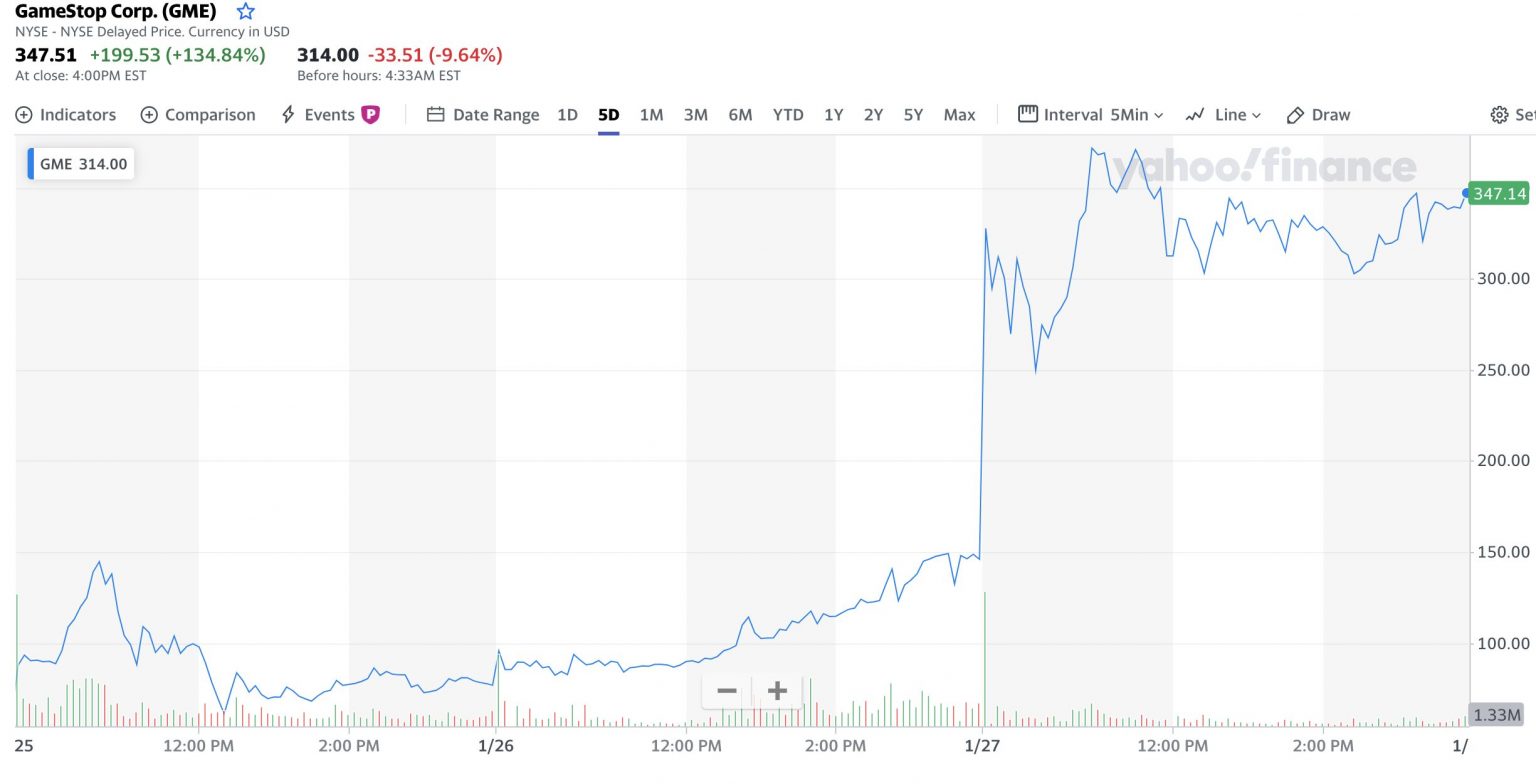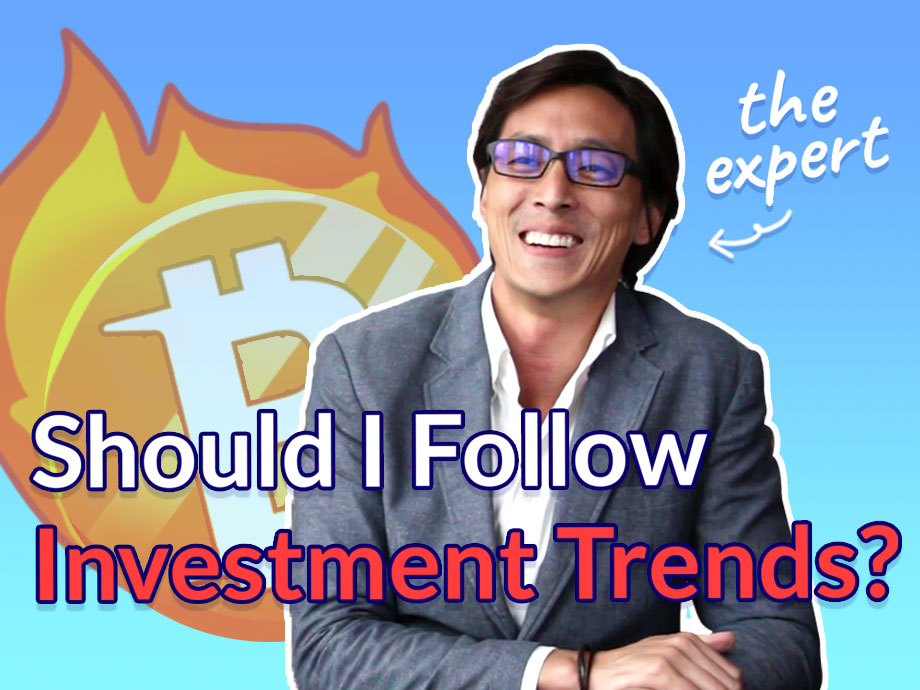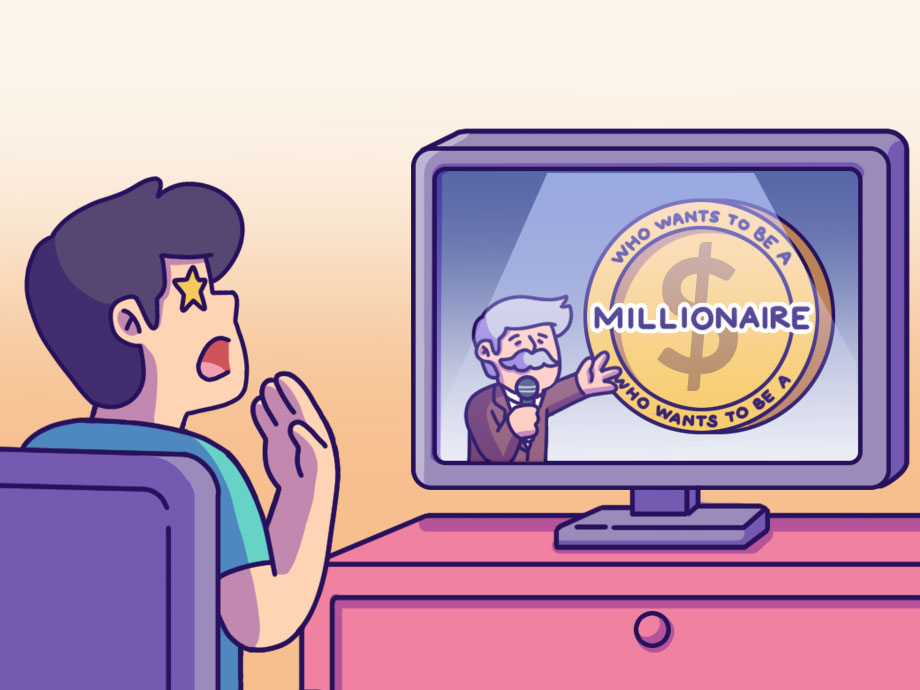Investing | Article
What’s the Deal With GameStop ($GME) and WallStreetBets?
by Sophia | 29 Jan 2021

Search ‘GameStop’ right now and you’ll get bombarded with hundreds of articles about Wall Street, skyrocketing share prices, hedge fund managers losing their jobs, and regular folks making millions of dollars in a matter of days. In particular, you’ll likely come across mentions of the subreddit r/WallStreetBets (WSB).
What the heck is going on?
For those of you who aren’t in the know, GameStop ($GME) is an American video game retailer, selling gaming consoles, merchandise, and video games. Its share price rose rapidly over the course of the week — so rapidly that it’s enough to outshine Bitcoin’s recent meteoric rise.
On Thursday, January 21, GameStop sat at $37.72 per share. As redditors of WSB converged to buy GME this past week, its share price shot up to a jaw-dropping $347.51 — nearly ten times its original price.

Some retail investors have reportedly made millions in earnings because of this massive rally around GameStop.

That’s insane. How did it happen so quickly? And what’s the hype all about?
To explain that we need to go all the way back to the beginning.
Ground zero: r/WallStreetBets (WSB)
Users on WSB started posting their positions in GME all the way back in early 2020, sparking some interest in the forum.
Then in December, reddit users discovered that institutional investors such as hedge funds had made huge bets that GME’s price would keep going down — these hedge funds had shorted GME.
This discovery was the catalyst for the stock market mania we’re witnessing now.
Don’t sell yourself short
What does shorting a stock, or short-selling mean?
We all know the adage ‘buy low and sell high’ – you buy a stock now hoping to make a gain when its price goes up in the future. Short-selling is the exact opposite of this.
An investor who short-sells basically sells shares that he doesn’t have right now in the hopes that he can buy those shares back again at a cheaper price in the future. Essentially, he’s betting that the stock price will go down.
How can one sell shares they don’t own? Well, short-selling is actually a form of borrowing. A broker, or investor “borrows” shares from another broker, or from its own pool of shares.
Let’s take Ben and Jerry. Ben thinks that Stock XYZ’s price is going to go down next month. Ben knows that Jerry owns 1,000 units of XYZ. Ben goes to Jerry and says, “Hey, Jerry could you lend me these 1,000 shares now, and I’ll give them back to you by next month?”
Jerry says okay and, theoretically, gives Ben those 1,000 shares. Ben takes these shares and sells them on the market, say, at $10. Now he’s got $10,000 cash from his sale.
If Ben is right, and the XYZ drops to $6 next month, he buys back 1,000 units of XYZ for only $6,000. He makes a cool $4,000 profit and returns the 1,000 units back to Jerry.
Now in the case of GME, this is exactly what hedge funds did. And they did it en-mass. These hedge funds assumed that GME (among other companies) wouldn’t survive the pandemic as GME’s business was largely dependent on foot-traffic to their physical retail stores.
Hedge funds don’t make these bets arbitrarily. They’ve got analysts that make predictions based on data and probability. Under usual circumstances, the chances that GME’s price goes down could have been high. But even if GME’s price went up, these hedge funds probably predicted that the increase would be small enough that it wouldn’t really impact their bottom line.
But these aren’t usual circumstances that we’re dealing with.
On WSB, reddit users caught on to the fact that hedge funds have shorted more GME stocks than there were trading in the market. Translation: Hedge funds sold more shares but there weren’t enough shares in the market for them to buy back.
Going back to our example with Ben, if he sold 1,000 shares of XYZ but the market only had 900 shares of XYZ trading a month later, he wouldn’t have 1,000 units to give back to Jerry.
With this knowledge, WSB users saw the opportunity to attempt a “short squeeze” on these hedge funds.
What’s a short squeeze?
A short squeeze happens when a stock’s price goes up and forces investors who are short-selling to buy back their stocks in order to minimise their losses. The effect? An upward pressure on the stock’s price.
So, WSB users started buying up whatever remaining GameStop shares on the market. When there’s not enough supply and a whole lot of demand, GME’s price went up fast.
The hedge funds who had shorted the stock were in deep trouble. With prices rapidly rising. they needed to cut their losses but there weren’t enough shares in the market for them to buy back!
Eventually, the short squeeze caused hedge funds to lose millions of dollars.
When will the Game Stop?
The hype is certainly exciting and enticing — after all, a hyperactive, vengeful subreddit of retail investors making thousands or even millions of dollars doesn’t happen everyday.
And some of us may feel tempted to jump on this train and go along for the wild ride, just to see if we can turn a quick profit from this madness.
But it’s always important to keep in mind that sudden stock rallies like these will likely end with a disastrous fall. And that’s because stock rallies like GME’s are largely driven by emotional investors with various underlying motives, not rational thought.
And investors’ emotions constantly fluctuate.
Retail investors who’ve bought into GameStop are thus in a precarious position. Some investors have already sold their positions. Some are just jumping in now. Others are still holding on to their shares and are eagerly urging others to hold onto their investments as well.
While WSB was able to rally enough individual investors to push GameStop’s price up, is it really possible to keep every single shareholder on the same page for a sustained period of time? No, definitely not.
Investors could decide to exit GME tomorrow. And just as herd mentality can drive stock prices up, if enough investors sell their stocks, prices could also drop in an instant.
For the less experienced retail investor, the hype and eventual decline causes a lot more fear and anxiety than necessary.
And losing money can bring about devastating results. A young trader lost his life to suicide after an error on Robinhood, a trading platform, reflected that he’d made huge losses.
Can you stomach the loss if GameStop, or other hype stocks crash? If not, there’s a less risky alternative.
An investing rule of thumb
Don’t get swept away by the mania in the stock market right now.
An important rule of thumb for investors, seasoned or not, is this: don’t put money into the market you can’t afford to lose. While it’s tempting to want to hop on the bandwagon, it’s best to be level-headed and rational about this, especially when it concerns your hard-earned money.
Instead, a newbie investor can consider less-risky options that aren’t based on hype or increased meme activity on reddit, such as ETFs. You may not see quick, short-term gains, but the risk involved will be much, much less.
Sure, building your wealth via the slower route is far less exciting. But at least you’re not putting tens of thousands of dollars at risk for no reason other than hype!
Bull runs that are fueled by hype will never last. It’s better to enter the market as a rational and mature investor, rather than getting lured in by the furore of an over-eager subreddit.
After all, bubbles, after a certain point, always burst.
















